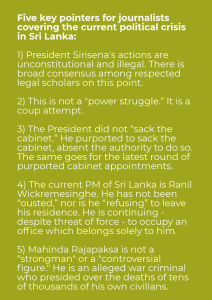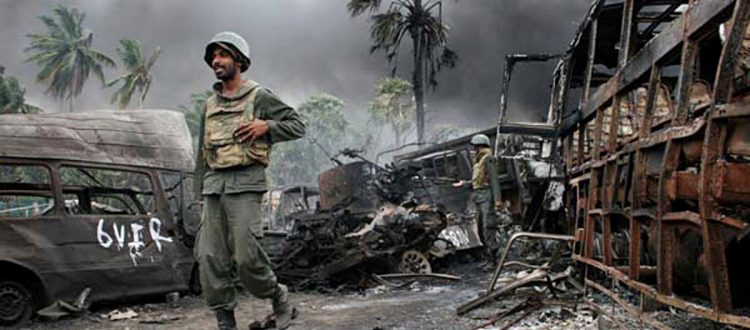Sri Lanka situation update
The Sri Lanka Campaign began to receive worrying ground reports of increased activity by the security forces in the North and East of Sri Lanka; possibly an indication of the beginning of a wider crackdown.
| Suggested Reading | Conflict Background | GCCT |
By the Sri Lanka Campaign for Peace and Justice
The past three days in Sri Lanka saw the intensification of public outcry over President Sirisena’s unconstitutional attempt to remove Prime Minister Ranil Wickremesinghe and replace him with former President Mahinda Rajapaksa. On Tuesday (30th October), thousands of protestors gathered peacefully in the capital Colombo to call on the President to immediately re-convene Parliament – and thereby to allow the question of who commands the confidence of a majority of MPs to be settled. A group of civil society representatives delivered a petition carrying that same message to Parliamentary speaker Karu Jayasuriya, who later wrote to the President expressing disbelief at the suspension of the democratic process and warning of a worsening of the crisis.
As of Wednesday (31st October) there were reports that Rajapaksa had secured the support of six additional MPs from the party of Prime Minister Wickremesinghe. Based on predictions about the likely allegiance of several smaller political parties, it is believed that a further nine defections would enable Rajapaksa to claim command of a majority in Parliament. As allegations swirled of vote-buying by the Rajapaksa bloc, on Tuesday the President purported to make a raft of new cabinet appointments, apparently in violation of the constitution.
International pressure continued to mount, with the EU and the UK both issuing statements calling on the President to immediately re-convene Parliament. The International Crisis Group released a briefing paper outlining a range of additional options for members of the international community to consider in responding to the crisis, including:
- Urging the military and police to enforce the law fairly and to refrain from cracking down on peaceful protest, making clear that training programs and other forms of security cooperation could be ended if they actively back Rajapaksa’s power grab.
- Reconsidering forms of economic support linked to democratic governance, including the EU’s recently restored GSP+ trade privileges and forthcoming development funding through the US’s Millennium Challenge Corporation (MCC).
- Beginning to look at targeted sanctions against Maithripala Sirisena and Mahinda Rajapaksa, as well as their families and close associates, should the coup attempt proceed.
- Committing to a further resolution on Sri Lanka at the UN Human Rights Council, so as to maintain oversight and scrutiny of the human rights situation on the island.
The International Commission of Jurists issued a hard-hitting statement, noting that “the failure to address past abuses, and to fully implement UN Human Rights Council Resolutions 30/1 and 34/1, has helped set the stage for the current political turmoil, and the possible return of an authoritarian figure who has proven his disrespect for human rights and the rule of law over and over.”
In another statement, Reporters Without Borders urged the Sri Lankan authorities “to respect journalists’ safety and editorial independence” after individuals loyal to Rajapaksa stormed several state media outlets.
The Sri Lanka Campaign began to receive worrying ground reports of increased activity by the security forces in the North and East of Sri Lanka; possibly an indication of the beginning of a wider crackdown.

The Sri Lanka Campaign for Peace and Justice is a member of the Global Coalition for Conflict Transformation, which is comprised of organizations committed to upholding and implementing the Principles of Conflict Transformation.
This article was originally published on the Sri Lanka Campaign website and is available by clicking here. The views expressed do not necessarily represent those of TransConflict.



















